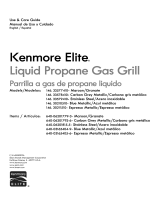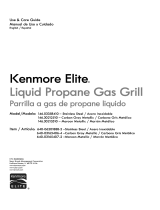
Propercareandmaintenancewillkeepyourgrillin
goodoperatingconditionandprolongitslife.Follow
thesecleaningproceduresonatimelybasisandyour
grillwillstaycleanandoperatewithminimumeffort.
CAUTION: Be sure your grill is off and cool before
cleaning, and always wear protective gloves when
cleaning your grill
Cleaning The Cooking Grates
Wash your cooking grates in a mild soap and
warm water solution. You can use a wash cloth,
vegetable brush, or brass bristled brush.
Never use any type of steel bristled brush. Dry
them when finished.
Cleaning the Heat Diffusers
Wash the heat diffusers periodically in a soap and
warm water solution. Use a vegetable brush to
remove stubborn burnt-on cooking residue. Dry the
heat diffusers thoroughly before you reinstall them
into the firebox.
Cleaning the Grease Tray and Pan
To reduce the chance of fire, the grease tray and
grease pan should be visually inspected before
each grill use. Remove any grease and wash both
with a mild soap and warm water solution.
Cleaning the Inside of the Grill Lid
Grease can have a tendency to build up on the
inside of the grill lid and could drip onto the deck or
patio when the lid is opened. Visually inspect the
inside of the grill lid before each grill use. Remove
any grease and wash with a mild soap and warm
water solution.
Annual Cleaning of the Grill Interior
Burning-off excess food after every cookout will
keep it ready for instant use. We recommend you
periodically give the entire grill a thorough cleaning
to minimize your risk of grease fire and keep the
grill in good shape. Follow these steps:
1. Turn all burner valves to the "OFF" position.
2. Turn the LP gas tank valve to the "OFF"
position.
3. Disconnect the regulator assembly from the
gas tank. Inspect the hose for cracking, cuts or
any other damage, and replace as necessary.
Refer to the Parts List in this Operator's
Nanual.
4. Remove and clean the cooking grates, heat
diffusers, warming rack, burners, and grease
tray.
5. Cover each gas valve orifice with aluminum
foil.
6. Brush the inside and bottom of the grill with a
fiber pad or nylon brush and wash with a mild
soap and warm water solution. Rinse
thoroughly and let dry.
7. Remove aluminum foil from orifices and check
each orifice for obstruction.
8. Replace the burners, ensuring the burners fit
down over each valve orifice.
]8
9. Check and clean each electrode tip. Adjust
the spacing between the tips and the burner
as necessary. The space between the
electrode tip and burner should be
approximately 3/16".
10. Replace the heat diffusers, grates, warming
rack, and grease tray.
11. Reconnect the gas source and observe the
burner flame for correct operation.
Cleaning Exterior Surfaces:
Cleaning Exterior Surfaces:
Wash with a mild dish soap and warm water
solution. A cloth, soft brush, or plastic
cleaning pad can be used. Rinse thoroughly
and wipe dry.
Cleaning Exterior Stainless Steel Surfaces:
Wash with a mild dish soap and warm water
solution. Clean and polish with a stainless
steel cleaner. There are many good quality
stainless steel cleaners and polishes
available. Follow the manufacturer's
directions. Always polish in the direction of
the lines. Do not allow dirt and grease to
accumulate. Do not use steel wool as it will
scratch the surface. Do not use abrasive
cleaners and scrubbers.
CAUTION:
Heat, weathering, machine oils used in the
manufacturing of stainless steel, and dirt can
all cause exterior stainless steel surfaces to
turn tan in color. In addition, the following
products and naturally occurring substances
in the outdoors will damage all stainless steel
finishes. Use caution so they will not come in
contact with your grill. Immediately wash
them off and dry the stainless steel should
they ever come in contact with your gas grill.
They include, but are not limited to, pool
chemicals (chlorine and bromine), lawn
fertilizer, ice melting salts, sea or salt water,
urine, bird droppings, and tree sap.
Failure to comply with these instructions may
result in a hazardous situation which, if not
avoided, may result in injury.
Keep grill area clear and free from
combustible materials, gasoline and other
flammable vapors and liquids.
Do not obstruct the flow of air for combustion
and ventilation.
Keep the ventilation openings of the tank
enclosure cabinet free and clear of debris.




























